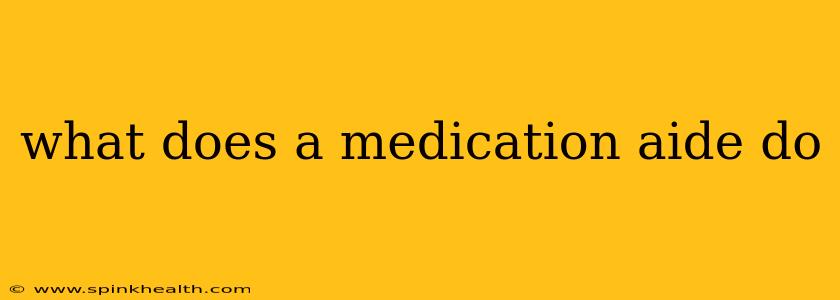What Does a Medication Aide Do? A Day in the Life
Imagine a world where elderly individuals or those with disabilities receive the vital medications they need, ensuring their health and well-being. This is the world of the medication aide, a crucial role in healthcare that often goes unsung. But what exactly does a medication aide do? It's more than just handing out pills; it's about providing compassionate care and ensuring medication adherence. Let's delve into a typical day and explore the multifaceted nature of this vital position.
My name is Sarah, and I've been a medication aide for five years. Every day is different, but there are consistent tasks and responsibilities that form the backbone of my work.
A Typical Day:
My day usually starts with a thorough review of the medication administration record (MAR). This is a crucial document that lists each resident's medications, dosages, and administration times. Accuracy is paramount; a single mistake could have serious consequences. I meticulously check each entry against the doctor's orders, ensuring everything aligns perfectly.
Then comes the preparation. I carefully check each medication against the MAR, verifying the name, dosage, and route of administration. I’m always mindful of potential drug interactions and allergies. I'm trained to identify potential issues and escalate concerns to a nurse immediately if something seems amiss.
Next, I begin the rounds. This is where I interact directly with the residents, delivering their medications with a smile and a kind word. It’s more than just giving pills; it's about building trust and rapport. I explain each medication, answering any questions the residents may have. Often, I’ll spend a few minutes chatting, offering companionship and a listening ear. For some residents, I’m the only person they see all day, and that connection is a significant part of my role.
After administering medications, I document everything meticulously. This includes noting the time of administration, any observations about the resident’s condition, and any potential issues encountered. Precise record-keeping is essential for maintaining accurate medical histories and ensuring continuity of care.
Beyond the Basics: Addressing Common Questions
My work frequently involves answering questions that are crucial for both the residents and their families. Here are some of the most frequently asked questions:
What are the qualifications to become a Medication Aide?
The requirements vary depending on the state and facility. Generally, it involves completing a state-approved training program that covers medication administration, safety procedures, and recognizing adverse reactions. A background check and drug screening are also standard procedures.
What are the responsibilities of a medication aide besides giving medications?
Medication aides also play a vital role in observing residents for any changes in their condition, documenting observations, and reporting them to the nurses. They may also assist with other tasks like charting, assisting residents with meals, and providing general support. The specific tasks can differ based on the setting and the facility's policies.
What is the difference between a Certified Nursing Assistant (CNA) and a Medication Aide?
CNAs have a broader scope of responsibilities than medication aides. While CNAs can administer medications in some settings, their duties extend to personal care, assisting with activities of daily living, and monitoring vital signs. Medication aides focus specifically on safe medication administration.
What kind of training is involved?
Training programs typically cover topics like pharmacology, medication administration techniques, recognizing adverse reactions, documentation, and maintaining confidentiality. They also emphasize ethical considerations and safety procedures to ensure that medication is administered accurately and safely.
What is the job outlook for medication aides?
The job outlook for medication aides is positive due to the aging population and the increasing need for healthcare services. The demand for skilled professionals in this field is expected to remain high for the foreseeable future.
Being a medication aide is more than just a job; it’s a vocation. It’s about making a tangible difference in the lives of others, one medication at a time. It’s about compassion, attention to detail, and the unwavering commitment to ensuring the well-being of those under our care. And every day, I feel privileged to play a part in this important work.

